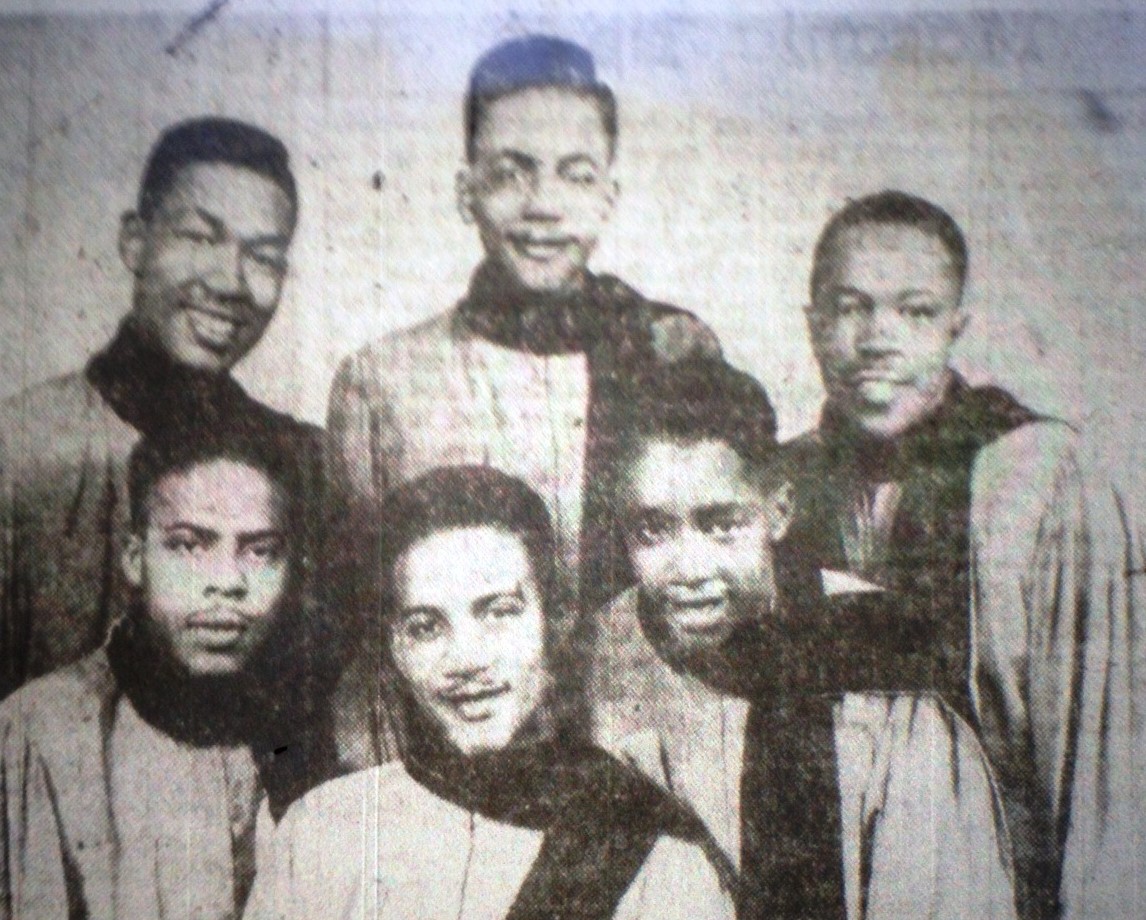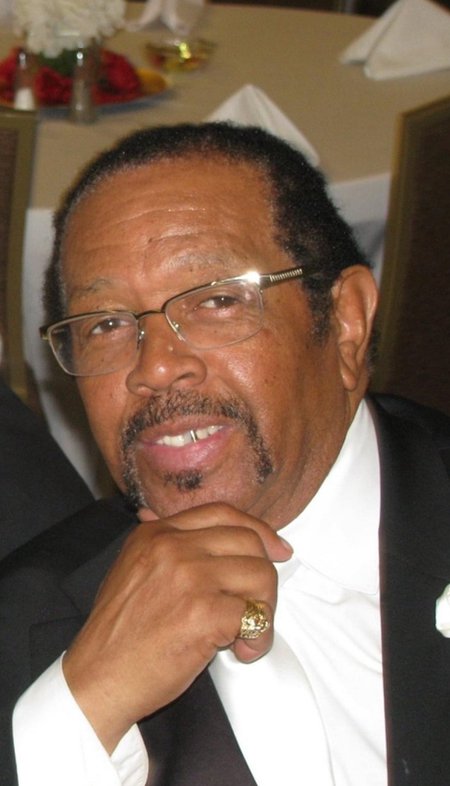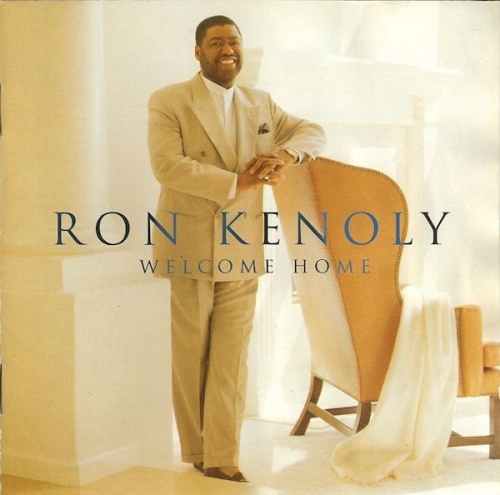
The Maceo Woods Singers, ca. 1954. Maceo Woods is at bottom, center.
By Bob Marovich
The Journal of Gospel Music was saddened to learn of the passing of the Reverend Maceo Woods today.
Maceo Len Woods was born April 23, 1932, to Fred and Rosa Anna Anderson Woods, who migrated from Mississippi to Morgan Park. By age twelve, Maceo was serving as organist for Mount Calvary Baptist Church in Morgan Park, where his family was a member. Initially drawn to a career in medicine, Woods became more interested in music.
Woods organized his first singing group, the Maceo Woods Male Chorus, at Mt. Calvary. Woods’ godfather, Eugene Smith of the Roberta Martin Singers, suggested the young man condense his fifty-voice chorus into a smaller aggregation so it could travel more cost-effectively. Woods heeded Smith’s advice and in 1952 formed the Maceo Woods Singers. They cut their first record, “Witness,” a Woods composition, for Apollo Records in 1953. It was a big hit, especially after the First Church of Deliverance Radio Choir took it up on its weekly radio broadcasts.
In addition to recording and performing with his own group, Woods was also the organist in Vee Jay Records’ house band, led by Al Smith. In summer 1954, Vee Jay owner Vivian Carter was searching for a theme song to accompany her religious program on WWCA. She asked Woods to come up with something on the organ for her to use, and that something turned out to be his performance of “Amazing Grace”—so good that Vee Jay released it as a single. “Amazing Grace” went on to become the best-selling gospel instrumental of all time, reportedly selling 200,000 copies in its first year of release.
The single sparked greater interest in the Maceo Woods Singers, and the ensemble embarked upon the national gospel highway. In his 2010 autobiography, A Graceful Journey, published by Pastor Mack C. Mason, Woods recalled that in live performances, his signature move was to appear in a white suit and, after playing the final chord, get up and walk around the organ, dusting it with his white handkerchief, as the tonic chord hung heavy in the air. Others remember him playing an organ that lit up on the stage.
In the mid-1950s, Woods augmented his music portfolio by producing live gospel music programs. His first Spiritual Cavalcade, later to be called Gospel Supreme, was held at Mount Calvary, where Willie Webb, Robert Anderson, James Lee, and Rev. Dwight “Gatemouth” Moore were special guests. Eventually, Woods’ programs became so popular that he hosted his 1956 Spiritual Cavalcade at Tabernacle Baptist Church. Mahalia Jackson told Woods his higher-than-normal admission fee for the program would not go over well, but it didn’t deter anyone. This event earned Woods a ministerial award “for his service to Christianity” and continues still today. It is one of the only programs in all of music that starts exactly at the appointed time.

Roberta Martin presents $250 scholarships to Joseph Washington and Maceo Woods (top right) at Pilgrim Baptist Church in 1953. Photo Credit: Chicago Defender
In late 1958, Bishop Chester Batey named Woods minister of music and director of the seventy-five-voice Hyde Park Bible Church choir. But Woods was unceremoniously relieved of his duties at Hyde Park Bible and on December 14, 1959, he received the calling to ministry and founded Christian Tabernacle Church in the home of a friend. There were eleven members at the start, including several who would go on to anchor the Christian Tabernacle Concert Choir: Doris Sykes, Melvin Smothers, Pearl McCombs, Eugene Borden, and William Kidd. In February 1960, Woods secured for his church space the Public Theater at 4712 South Prairie. By October 1960, Christian Tabernacle counted 814 members, 92 percent under the age of 37.
Sykes, Smothers, McCombs, and Borden organized themselves into the Christian Tabernacle Ensemble to sing for services. Over time, the group grew to include Lawrence Ester, Alfreda Burton, Nelson Dupree, and George Jordan. The Christian Tabernacle Ensemble evolved into the Christian Tabernacle Concert Choir with about thirty members. The choir’s first significant commercial recording was “Hello Sunshine,” written by Jessy Dixon, who had recorded the song initially with the Chicago Community Choir.
Harold Freeman’s Righteous Records released “Hello Sunshine” as a single, and it garnered so many spins on WBEE by announcer Rev. Dwight “Gatemouth” Moore that Ernie Leaner of United Distributors felt national distribution was in order. He put Woods together with Al Bell at Stax Records in Memphis, and Hello Sunshine was reissued on Volt.
Henceforward, the Christian Tabernacle Concert Choir enjoyed a string of albums and singles with Gospel Truth, the gospel subsidiary of Stax in Memphis. It was for Gospel Truth that the original “Jesus Can Work It Out,” written by George Jordan, made its debut, and it was re-recorded when the group switched to Savoy Records; and its own imprint, Gospel Supreme, named for the annual gospel music extravaganza that Woods started.
I will always remember Rev. Woods as a quiet man of deep religious conviction who never seemed to age. He will be missed dearly. Home going information will be made available as soon as it is posted.
References:
Marovich, Robert M. A City Called Heaven: Chicago and the Birth of Gospel Music. Urbana, IL: University of Illinois Press, 2015.
Nations, Opal Louis. “Maceo Woods: The Vee Jay Years.” Blues Gazette, Fall, 1996.
Woods, Pastor Maceo L. w/Mason, Mack C. A Graceful Journey. Hazel Crest, IL: Faithday Press, 2010.
One Comment
Leave A Comment
Written by : Bob Marovich
Bob Marovich is a gospel music historian, author, and radio host. Founder of Journal of Gospel Music blog (formally The Black Gospel Blog) and producer of the Gospel Memories Radio Show.












 Visit Today : 10
Visit Today : 10 This Month : 135
This Month : 135
[…] he still knew how to capture a crowd, Marovich wrote: “In his 2010 autobiography ‘A Graceful Journey,’ published by Pastor Mack C. Mason, Woods […]